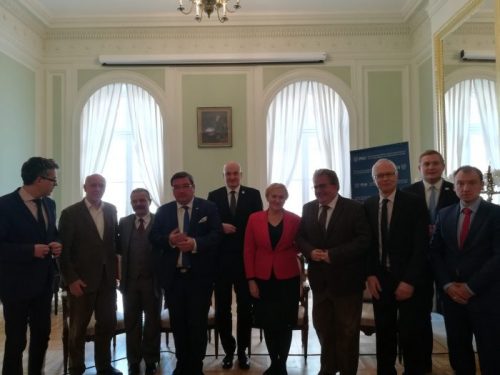On 10th October 2019, the conference ‘The Future of the EU, Military Cooperation and Transatlantic Relations from Polish and French perspective’ took place at the Scientific Centre of PAS in Paris. The event was also co-organized by the following institutions: CERI Sciences Po from Paris, the Polish Science Contact Agency PolSCA in Brussels and the Polish Institute of International Affairs (PISM).
The conference was opened by: dr habil. Maciej Forycki, director of the Scientific Centre of the Polish Academy of Sciences in Paris, dr Sławomir Dębski, director of PISM, prof. Alain Dieckhoff, director of CERI Sciences Po and dr hab. Małgorzata Molęda-Zdziech, director of the PolSCA Office. All of them agreed on the fact that the conference is one of the of events taking place in 2019, the Polish-French Year of Science. The directors of the PAS Scientific Centres pointed out that the common conference is the result of the fruitful cooperation.
The guests were also greeted by Mr. Tomasz Młynarski, Ambassador Extraordinary and Plenipotentiary of the Republic of Poland in the French Republic and the Principality of Monaco, who participated in the first part of the conference.
The first panel was devoted to discussing the process of shaping the European landscape after the European Parliament elections (“Landscape after the European Parliament elections: convergence, differences, challenges of Polish and French European policy”). The Polish side was represented by: prof. Przemysław Żurawski vel Grajewski, from the University of Lodz and the National Development Council from the Chancellery of the President of the Republic of Poland and prof. Małgorzata Molęda-Zdziech. The French side – prof. Christian Lequesne, from CERI Sciences Po and moderator – prof. Jacques Rupnik, CERI Sciences Po, expert on Russia and Europe. Professor Rupnik briefly recalled the political history of European integration, highlighting the subsequent phases of EU enlargement. He reminded that 2019 is the 30th anniversary – symbolic of 1989 – of “the end of the Iron Curtain Era.” The year 1989 became the turning point for the end of the dualistic division in Europe. The 2019 EP elections re-shaped the political scene again, by increasing the impact of the European Green Party.
Professor Żurawski vel Grajewski emphasized geopolitical aspects and threats from Russian side, underlining the need to maintain constant readiness for defense. Professor Molęda-Zdziech emphasized the role of high turnout in EP elections, which is a new quality and a sign of civic involvement. In her speech, she focused on the evolution of the image of Europe and the mutual perception of France and Poland, referring to public opinion research. She noted that the perception of Poland has changed. She reminded that when she studied in France in the 1980s, she was treated as a representative of Eastern Europe. When she cooperated with Sciences Po at the beginning of the 21st century, she was already a representative of Central and Eastern Europe. Currently, however, the French are increasingly referring to the category of Central Europe (French: médiane). CBOS research results on the perception of France in Europe show that the role of France is decreasing. Also the image of President Macron is changing: not many respondents considered him as a statesman.
The second panel concerned the future in military policy (“Prospects for military cooperation: CSDP (in particular PESCO), NATO and the European Intervention Initiative (E2I)”. The panellists were: Dr. Hugo Meijer, Research fellow, CNRS / CERI Sciences Po and dr Marcin Terlikowski, head of the International Security Program at PISM. They stressed out that nation states should spend more funds on military policy, including Poland as well. The French expert emphasized the need to move away from the traditional approach to defense – technological changes have influenced the transformation of this policy and the global nature of threats.
The last panel entitled “The transformation of international relations” focused on changes in international relations. It was attended by: dr Sławomir Dębski (PISM) and prof. Alain Dieckhoff, from CERI, Sciences Po, and the moderator was dr hab. Agnieszka Cianciara (the Institute of Political Studies of the Polish Academy of Sciences). Professor Cianciara asked panelists for mutual assessment of the role of Poland and France in international politics, indicating its strengths and weaknesses.
Zamknięcia i krótkiego podsumowania konferencji dokonał dr Łukasz Jurczyszyn, ekspert PISM w programie Trójkąta Weimerskiego. Konferencja spełniła stawiany jej cel, umożliwiając ekspertom oraz akademikom z Polski i Francji wymianę analiz i doświadczeń na tematy poruszane podczas trzech paneli. Uczestnicy dyskusji panelowych przedstawili fakty oraz zarysowali perspektywy odnośnie przyszłości UE, współpracy wojskowej obu państw, oraz relacji Europy z USA, które ulegają tak dynamicznej zmianom.
The closing and short summary of the conference was done by dr Łukasz Jurczyszyn, PISM expert in the Weimar Triangle program. The conference got together experts and academics from Poland and France to exchange opinions and experiences on topics raised during these three panels. Panellists presented facts and outlined prospects for the future of the EU, military cooperation of both countries, and Europe’s relations with the US, which are changing so dynamically.
During lunch, the conference participants received news about the Nobel Prize in Literature for Olga Tokarczuk. This information was met with ovation.
A detailed program of the event with photos can be found here.

@Stacja Naukowa w Paryżu 
@Stacja Naukowa w Paryżu 
@Stacja Naukowa w Paryżu 
@Stacja Naukowa w Paryżu 
@Stacja Naukowa w Paryżu 
@Stacja Naukowa w Paryżu



